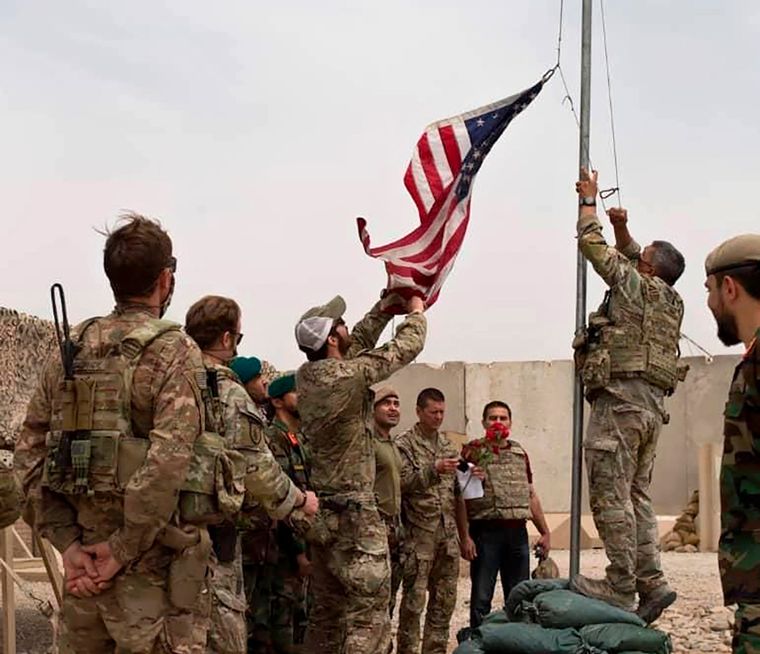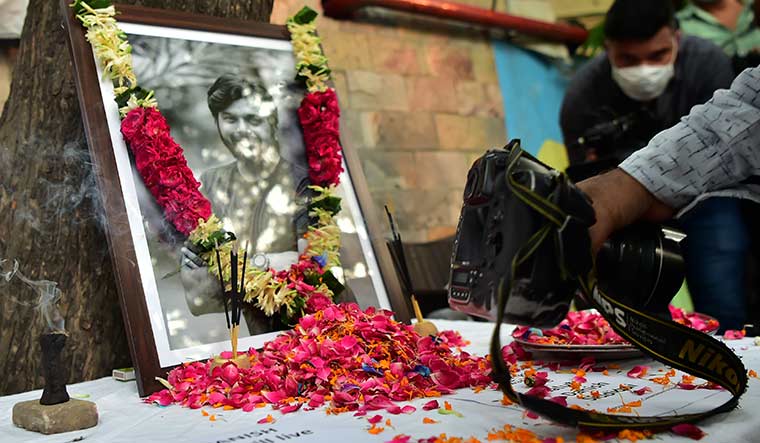For the Taliban, peace is the first option, says Zabihullah Mujahid, a spokesperson for the group. The 40-something Mujahid is in an undisclosed location, from where he spoke to THE WEEK. In a 45-minute-long interaction, Mujahid spoke with elegance and courtesy, expressing the Taliban's desire for a progressive Afghanistan. He said the group welcomes every initiative towards a peaceful solution, as long as there was no meddling in the internal affairs of Afghanistan. As Mujahid prefers to remain faceless, he did not share his photos. Excerpts from the interview:
So many countries are involved in chalking out Afghanistan’s future.
We welcome initiatives of other nations to bring peace to Afghanistan, like the efforts at the intra-Afghan talks in Qatar. But we make this very clear—we accept efforts at facilitating peace talks, but we do not accept anyone's interference in our internal matters.
What are your observations about the US involvement?
The US was in direct conflict with us; it had waged a war on our country. But since the talks in Doha in May, it has assured that it will withdraw its troops by August, and the forces have begun leaving. This is good.
What outcome are you expecting from the intra-Afghan talks?
Our hope from the Doha talks is that the conversation for peace continues, this is to the benefit of Afghan citizens. We hope that in future, these talks lead to a better outcome. We want peace. Notwithstanding whatever happened in Afghanistan in the past, the future hinges on peace. It is our first option, and we want initiatives towards a peaceful resolution of issues to be given a chance.
The youth of Afghanistan, however, reject the Taliban. They look upon you as an outdated outfit, which does not respect values like democracy and equal rights.
The 20 years of US imposition in our country has created this mindset among a certain section, but it is not true for the majority. The people of Afghanistan want independence from foreign intervention, they want the country to have peace and to be ruled by Afghans, under Afghan laws. Is it not significant that in two months we have established control over 200 [of the 400] districts in the country? It could not have happened without their acceptance. The Afghan people want their own government and laws. External interference is against the belief of the Prophet himself. The Afghans do not have faith in the US.
How much Afghan territory is under Taliban control as of now?
According to our information, 85 per cent of the country is under our control.
But the Ashraf Ghani government says this is not true.
The Afghans do not even consider Ghani as their representative. For his own reasons, for appeasing the external (US) influence, he will make wrong claims. But if Ghani had supporters in his own country, he would not have needed foreign troops on this soil. Why is he scared? He is the one telling lies.
Despite your claims of controlling over 85 per cent of Afghanistan, even you will agree that you do not have influence in the urban areas. In fact, despite taking over Qala-e-naw (capital of Badghis province), the city slipped out of your hands.
The reason is not our inability. We ourselves do not want to enter cities at this stage. Cities have businesses, enterprise, markets, and we do not want to destabilise this structure. If cities become battlefields, many innocents will suffer. That is why we want to stay on the periphery of cities at present. We want to give a chance for peaceful resolution of differences and issues through dialogue. This is our outlook. However, if the issues are not resolved within a certain time-frame, we will have no option but to take over the control of cities by force. With regard to Qala-e-naw, we did not want to vitiate the festive occasion of Eid with bloodshed.
How safe is Afghanistan right now? Internationally, it is regarded as a very unsafe place.
You are right, Afghanistan has not been a safe place. We have been at war for 20 years, so many countries have deployed weapons on this land. It was our helplessness that there was no peace here, that innocent Afghans had to make sacrifices while the struggle against foreign influence was on. War is not good, but there was no option. However, in the territory under our control, there is peace now. Elsewhere, there is unemployment and hunger.
Why was photojournalist Danish Siddiqui killed?
His death is not related to the Taliban, he was caught in the crossfire. He was himself responsible for his death, for entering the crossfire and risking his life. We don't know whose gunfire killed him. The Taliban is not targeting journalists, but we are not responsible if someone gets hurt by coming into the midst of the battle.
Who will want to have any links with Afghanistan, or visit for tourism and business?
Once the external forces leave, we want to establish Islamic law here and reach out to other nations—Asia, the Islamic world, Europe, America—to establish diplomatic and trade ties, and revive our economy. When that happens, people from all over the world will want to visit
Afghanistan.
What role do you see for India in your vision for Afghanistan?
Our plans include India. We want to have diplomatic ties with India. In the past, we have not had good ties. India has supported the foreign forces system, it supplied equipment for the war, leading to our own people becoming martyrs. We hope India rethinks its position on the diplomatic way forward.
Are you saying India helped in the war?
India's role in Afghanistan so far has not been good. It gave helicopters which are used to bombard our population. India took sides in an internal matter, aiding one side to kill another section of Afghans. This is not the type of relationship we want. We want ties of diplomacy, respect and economy.
Has any Indian leader contacted the Taliban leadership?
So far, I have no information that any Indian leader has reached out to us. If I come to know something, I will let you know.
If India reaches out, will you talk?
We are in favour of countries like India and others reaching out and wanting to have talks with us. We are certainly willing to have a conversation, if they are willing to discuss our issues and (support us). We will definitely welcome it.
Has the Taliban reached out to the Indian government?
Not yet. We have been busy with our own matters. We also have issues with India because of its policy of aiding one section of Afghans with guns and equipment. We do not want such ties. If India changes its policies, Inshallah, we will have talks.
What do you have to say about Pakistan's role in Afghanistan?
Pakistan is our neighbouring country; it gave shelter to Afghan refugees. We have good ties and want to continue that way with Pakistan, and also with all other countries we share a border with, like Turkmenistan, Iran, Tajikistan, China and Uzbekistan.
Has Pakistan helped the Taliban?
No, no, neither Pakistan nor any other country has helped us. If anyone says otherwise, that is wrong. No country is helping us.
But Pakistan trains Taliban cadres.
It is propaganda. We do not need training. We have the experience of being at war for 40 years. We do not need someone else to train us. In fact, if anyone else wants training, we can train them, we have so much experience.
Will the Taliban be able to form a government?
Yes, we want the Taliban system to govern the entire country. The Taliban has struggled for Afghanistan's independence, it is our right to govern the country.
In your rule, will women also find a place?
Women have rights under Islam. Within the system of Islam, whatever rights they have, they will have access to them.
Is it possible that a woman will be the leader of the country under a Taliban regime?
Once we have formed our government and laws, the leaders will decide who will be given what position. Under the framework of Islam, women have the right to employment, education and service to the country. Within that framework, they will be given their rights and roles when our laws are formed.
So many Afghan Hindus and Sikhs have left the country, what is your comment on this?
They are Afghans, they have rights in this country. We are responsible for ensuring they get their rights. Under our regime, we hope all religions will coexist. We want them to return and work towards making the country prosperous.
Twenty years ago, the Taliban destroyed the ancient Bamiyan Buddhas. Do you regret that?
That incident was under a past regime, we do not want to have any association with it. It is in the past.
But are you sorry?
No, the issue of regret doesn't come in because there are no followers of Buddhism in Afghanistan today.
How do you say Hindus and Sikhs will be ensured protection to follow a faith different from Islam when you do not regret the destruction of the Buddha statues?
See, there are no practising Buddhists in Afghanistan today. If there was a single Afghan Buddhist, it would be their right to practise their religion, and we would respect that. There are Afghan Hindus and Sikhs, so there is a difference. We do not want their temples and gurdwaras to be destroyed.
Would you want Afghanistan to participate in sports, go explore outer space?
Yes, of course, we want Afghans to participate in the Olympics. Science and sports both are important for a new Afghanistan to have independent thinking. In the past, too, our teams have taken part in international sports meets.
We hear there is a power struggle within the Taliban.
We have unity. We have a single leader and we have good coordination between our leaders. There is no conflict.
Ten years hence, what will Kabul be like?
Inshallah, Afghanistan will be considered a good country. After the war is over, Afghanistan will emerge as the centre for trade and commerce, the link between east and west Asia. There will be growth and prosperity, the country will be full of people again.




